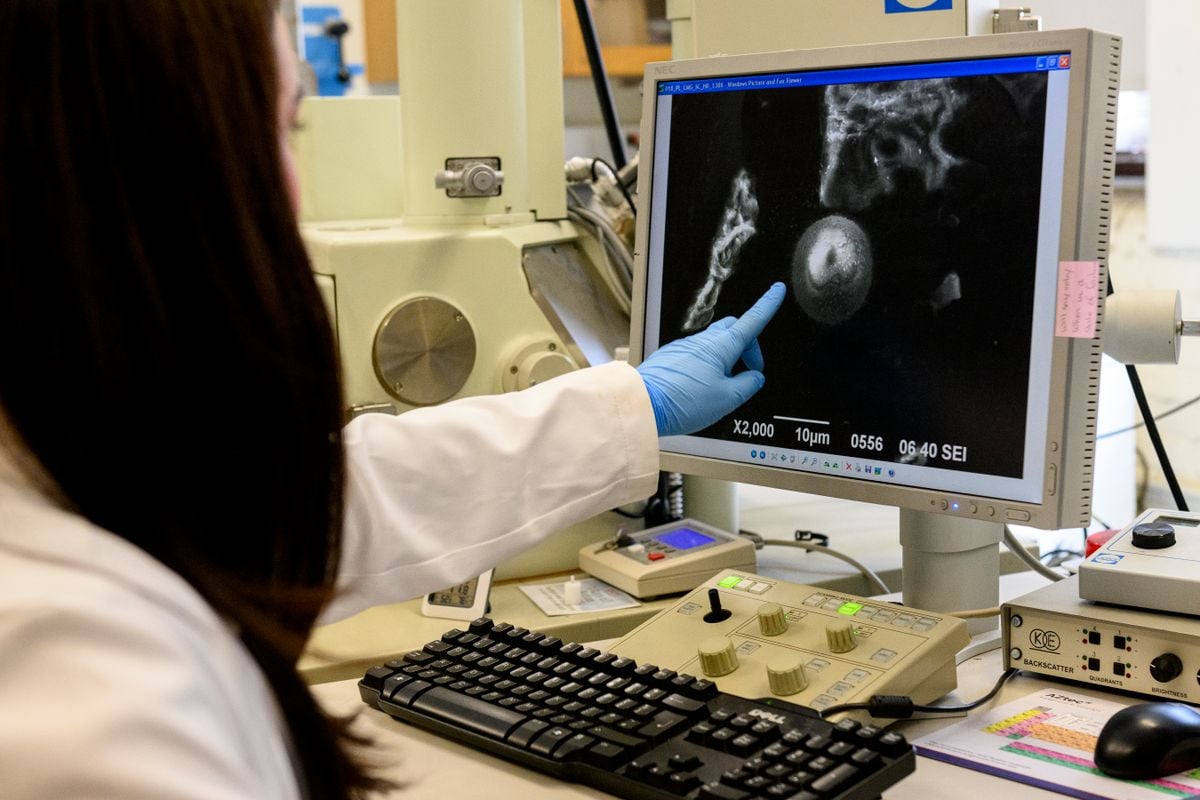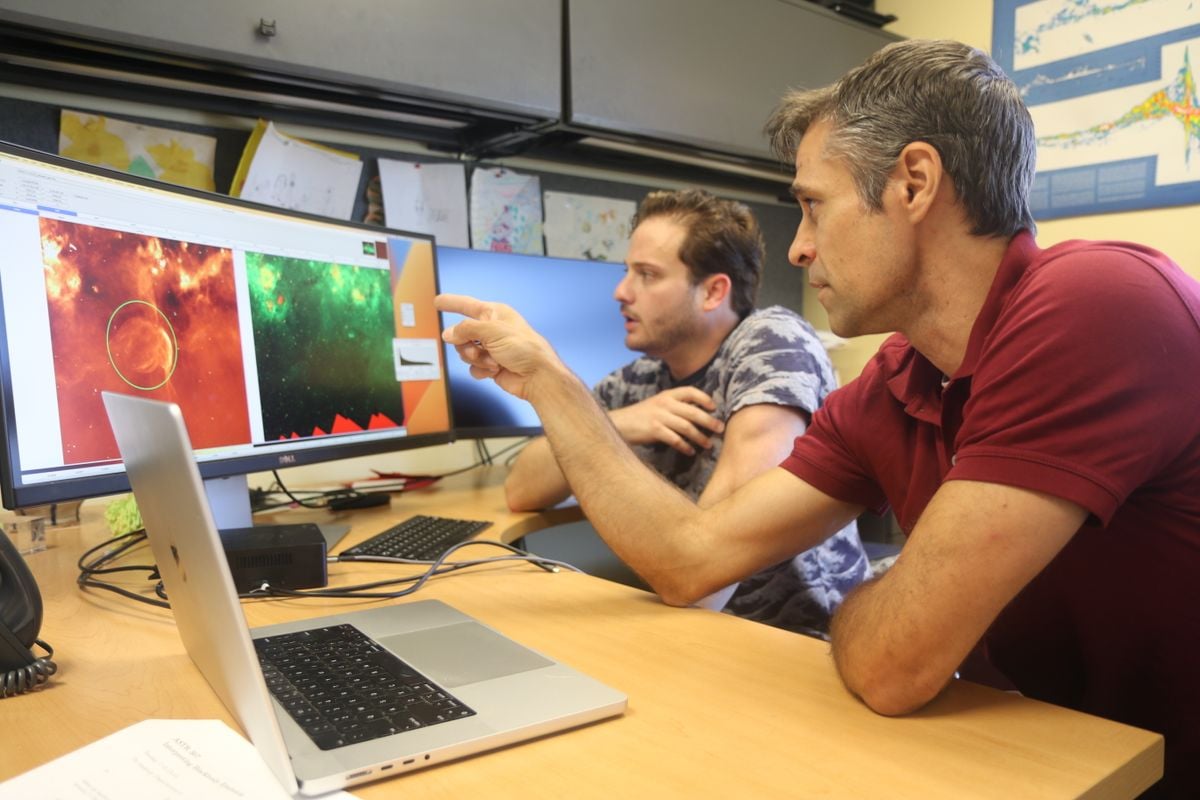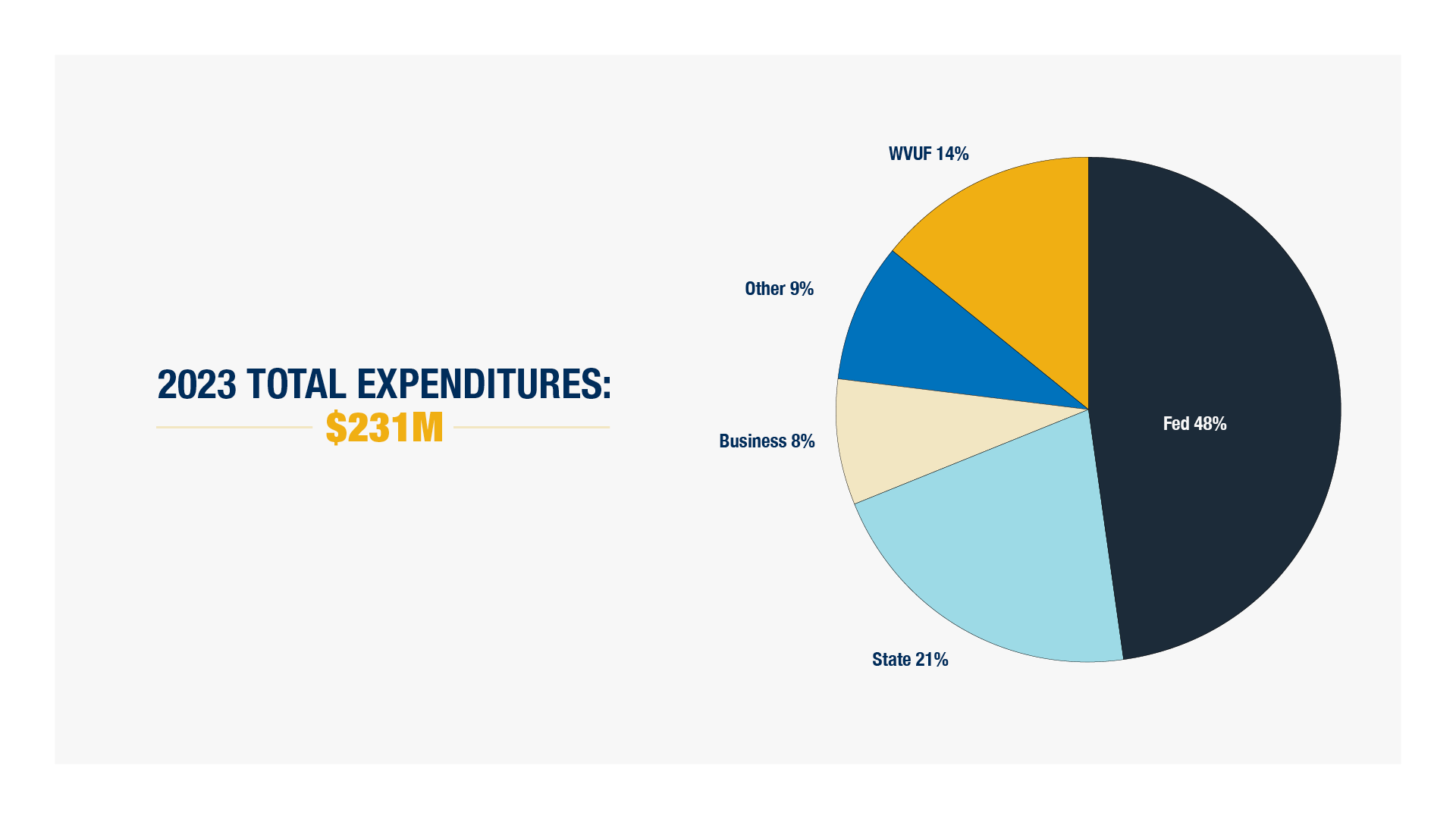
Kourtney Dalzell, a doctoral student at West Virginia University, examines the image of a spherical microparticle of gunshot residue. (WVU Photo/Matt Sunday)
Here’s a recent number of exciting news stories at WVU making headlines. From new research breakthroughs to student achievements, there was something for everyone to celebrate. Read the recap of novel developments in R1 research, graduate school leaders, and award-winning Mountaineers.
WVU researchers capture atomic view of synthetic DNA
Researchers at West Virginia University have been able to view synthetic DNA at the atomic level. This has given them a better understanding of how the DNA works and how it could be changed to improve its function. The researchers believe that this new understanding of the structure of synthetic DNA could lead to the development of new treatments for diseases such as retinal degeneration or cancer. They are also hopeful that it could be used to develop new diagnostic tools.
The study is a significant step forward in the understanding of synthetic DNA and its potential applications. It provides a roadmap for future research and could lead to the development of new technologies that could improve human health.
WVU forensics lab cracks case on newer, ‘greener’ gunshot residue
West Virginia University forensic scientists have made a breakthrough in the detection of gunshot residue (GSR) from newer, "greener" types of ammunition. The discovery could help investigators solve more crimes and bring criminals to justice.
The WVU team developed a new method for detecting GSR that is more sensitive to the presence of barium and antimony in newer types of ammunition. The method uses a technique called laser-induced breakdown spectroscopy (LIBS), which can identify the presence of specific
In many cases, the presence of GSR is the only physical evidence that can link a suspect to a crime scene. The WVU team's new method could make it easier for investigators to find and identify GSR, which could lead to more convictions.
Learn more about studying forensic science at WVU.
NIH leader to head research and graduate education efforts at WVU Health Sciences
Ming Lei, a seasoned scientist with years of experience overseeing federal programs that support research, has been named senior associate vice president for Research and Graduate Education at West Virginia University Health Sciences. Lei, who has served as director of the Division for Research Capacity at the National Institute of General Medical Sciences since 2008, will assume his new role beginning August 15.
In his new role, Lei will be responsible for leading and coordinating research and graduate education efforts across the WVU Health Sciences campus. He will also work to develop and implement strategies to enhance the research enterprise and to attract and retain top talent.
Lei's appointment is a significant step forward for WVU Health Sciences. He brings a wealth of experience and expertise to the role, and he is well-positioned to lead the research enterprise to new heights.
WVU researchers develop hydrogen technology to curtail greenhouse gases from food, beverage industry
West Virginia University researchers are developing a hydrogen-powered boiler that could help the food and beverage industry reduce its greenhouse gas emissions. The boiler, which is still in development, would use hydrogen instead of fossil fuels to produce heat and steam. This would significantly reduce the amount of carbon dioxide and other pollutants emitted by the industry.
The project is led by Hailin Li, a professor of mechanical and aerospace engineering at WVU. Li said that the boiler could help the food and beverage industry meet its sustainability goals. "The food industry is facing the challenge of how to diminish and eventually eliminate CO2 emissions," he said. "If industry leaders really want to achieve that goal by 2050, they have to either burn carbon free clean fuel or consume clean electricity."
The boiler is funded by a $3 million grant from the U.S. Department of Energy. Li said that the team hopes to have a prototype of the boiler up and running within the next year.
Take a closer look at Mechanical and Aerospace Engineering at WVU.
WVU students, alumna awarded prestigious NSF graduate fellowships
Three West Virginia University students and one alumna have been awarded prestigious National Science Foundation Graduate Research Fellowships. The fellowships are highly competitive and recognize outstanding students who have demonstrated the potential to become future leaders in research.
The WVU recipients are:
-
Alexander C. Brown, a Ph.D. student in mechanical and aerospace engineering. Brown is working on developing a new type of engine that could be used in hybrid and electric vehicles.
-
Sofia J. Contreras, a Ph.D. student in chemistry. Contreras is studying how to use nanotechnology to develop new drugs and treatments for cancer.
-
Akash Kumar, a Ph.D. student in computer science. Kumar is working on developing new algorithms for machine learning and artificial intelligence.
-
Kristin A. Miller, an alumna of WVU who is now a Ph.D. student at the University of California, Berkeley. Miller is studying how to use bacteria to clean up environmental pollution.
The NSF Graduate Research Fellowships provide a stipend of $34,000 per year, plus tuition and fees. The fellowships also provide opportunities for professional development and networking.







